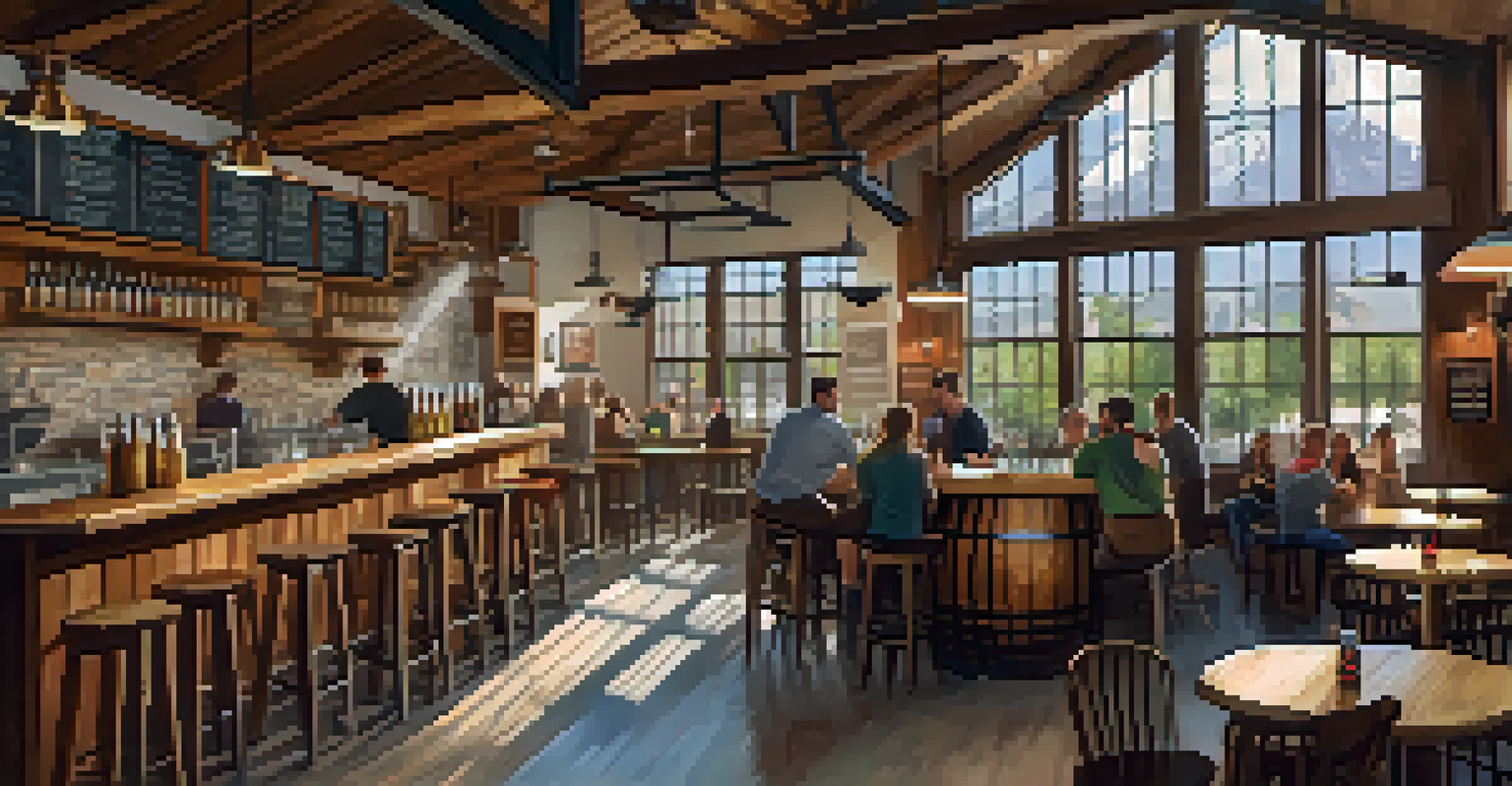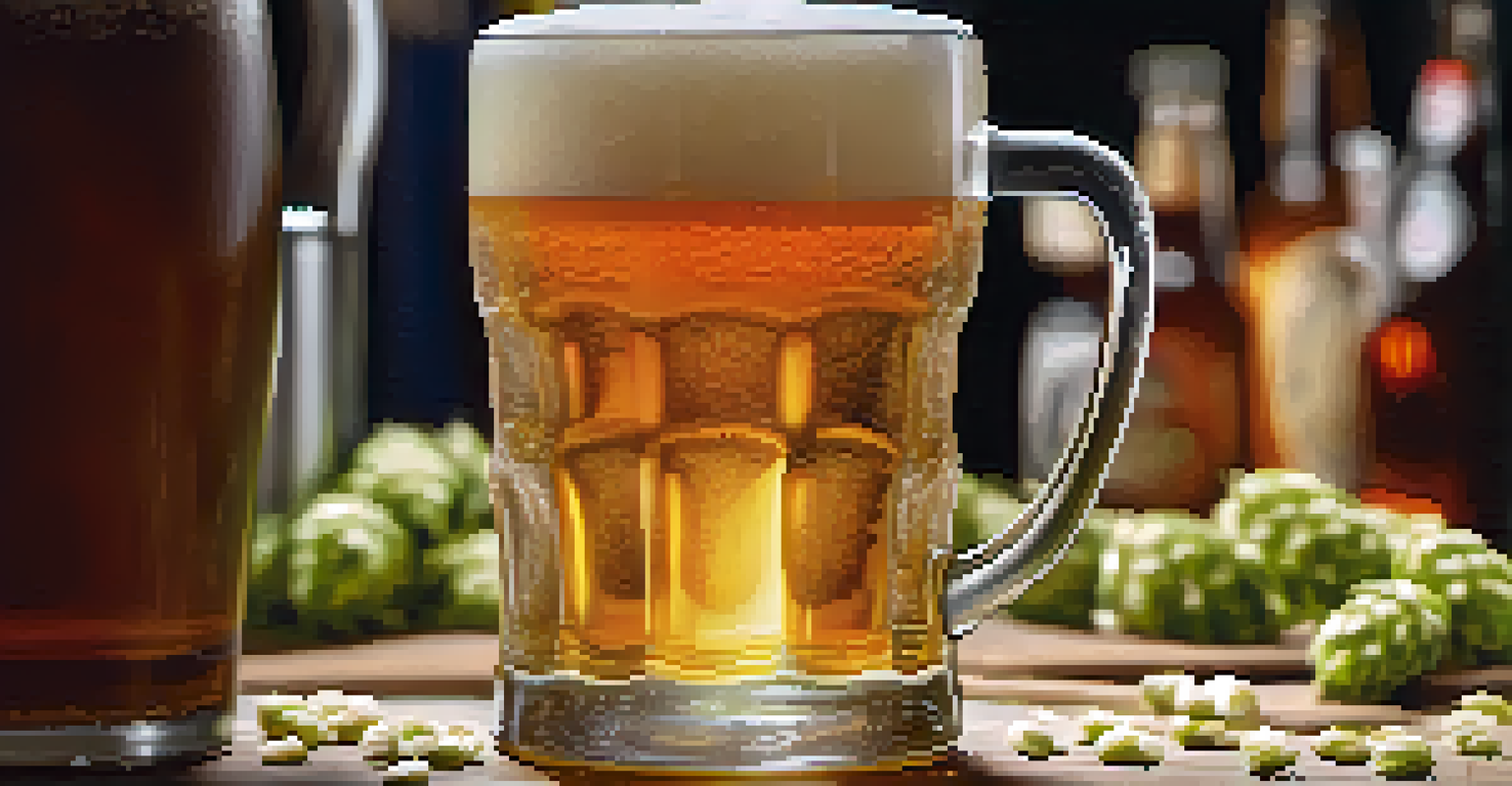The Rise of Craft Beer Culture in Boulder: A Historical Overview

The Early Beginnings of Boulder’s Brewing Scene
Boulder’s brewing culture can trace its roots back to the 1800s when pioneers settled in the area. These early settlers brought their brewing traditions with them, creating a small but dedicated community of beer enthusiasts. The first significant brewery, the Boulder Beer Company, was established in 1979, paving the way for a craft beer revolution.
Beer is proof that God loves us and wants us to be happy.
During this time, the craft beer movement was just beginning to take shape across the United States. Boulder, with its rich agricultural land and access to pure water from the nearby mountains, quickly became an attractive location for craft brewers. The combination of local ingredients and innovative techniques set the stage for what was to come.
The establishment of Boulder Beer Company marked the start of a new era, inspiring others to join the movement. The idea of crafting beer in small batches resonated with locals, leading to an increased appreciation for quality over quantity.
The Craft Beer Boom of the 1990s
As the 1990s rolled in, Boulder experienced a craft beer boom that transformed its local landscape. This decade saw the birth of several notable breweries, including the popular Avery Brewing Company and the award-winning Left Hand Brewing Company. These establishments not only contributed to the local economy but also brought national attention to Boulder as a craft beer destination.

With more breweries opening, the competition fostered an environment of creativity and innovation. Breweries began experimenting with unique flavors, styles, and brewing techniques, which captivated both locals and visitors alike. Festivals celebrating craft beer began to spring up, further solidifying Boulder’s reputation.
Boulder's Brewing History
Boulder's brewing culture began in the 1800s and was significantly shaped by the establishment of Boulder Beer Company in 1979.
The craft beer scene blossomed into a vibrant community where collaboration and camaraderie thrived. Brewers began hosting events and tastings, allowing beer lovers to connect with the people behind their favorite brews, creating a sense of belonging.
The Influence of Local Ingredients on Craft Beer
Boulder’s unique geography and climate have played a crucial role in shaping its craft beer. The availability of local ingredients, such as hops and barley, allowed brewers to create beers that were not only flavorful but also representative of the region. This use of local resources became a defining characteristic of Boulder’s craft beer culture.
Good people drink good beer.
In addition to traditional ingredients, many breweries began to experiment with local fruits, herbs, and spices. For example, breweries like Upslope Brewing Company embraced the local agricultural bounty, incorporating ingredients like Colorado peaches into their recipes. This not only enhanced the flavor profile of their beers but also connected drinkers to the region’s rich farming heritage.
This emphasis on local sourcing fostered a strong community spirit among brewers and consumers alike. People began to appreciate the stories behind each brew, leading to a deeper connection to their local breweries and the craft beer culture as a whole.
The Role of Local Breweries in Community Building
Beyond just crafting exceptional beers, Boulder’s breweries have become pivotal in community building. Many breweries host events that encourage social interaction, from trivia nights to charity fundraisers. These gatherings create spaces where locals can come together, fostering a sense of belonging and shared experience.
Breweries often collaborate with local artisans, musicians, and food vendors, further intertwining themselves with the community. This collaboration not only supports local businesses but also enriches the overall experience for patrons. For example, a brewery might feature a local band on a Saturday night, creating a lively atmosphere that draws in crowds.
Craft Beer Community Growth
The 1990s craft beer boom fostered creativity and collaboration among local breweries, turning Boulder into a vibrant craft beer destination.
The sense of community cultivated by these breweries has made Boulder a welcoming place for craft beer enthusiasts. Whether you’re a lifelong local or a curious visitor, there’s a sense of camaraderie that permeates the atmosphere of Boulder’s breweries.
Boulder's Craft Beer Festivals: A Celebration of Culture
One of the most exciting aspects of Boulder’s craft beer scene is its festivals, which celebrate the creativity and diversity of local brewers. Events like the Boulder Craft Beer Festival bring together a wide array of breweries, showcasing their unique offerings. These gatherings not only provide an opportunity to taste a variety of beers but also allow attendees to meet the brewers behind the brands.
These festivals have become a significant draw for tourists and locals alike, generating excitement and engagement within the community. Attendees often share their experiences on social media, further spreading the word about Boulder’s vibrant craft beer culture. This word-of-mouth marketing has proven invaluable in promoting local breweries.
Moreover, the festivals often feature local food vendors and live music, creating a festive atmosphere that encourages attendees to linger and enjoy. It’s a celebration of not only beer but also the community that supports it, making these events a highlight of the year for many.
The Impact of Craft Beer on Boulder’s Economy
The craft beer industry has had a significant impact on Boulder’s economy. With over 30 breweries in the area, the sector generates millions of dollars in revenue annually. These breweries not only create jobs but also stimulate growth in related industries, such as agriculture, hospitality, and tourism.
As craft beer continues to gain popularity, Boulder has become a destination for beer tourism. Visitors flock to the city to experience its renowned breweries and attend beer-related events, contributing to the local economy. This influx of tourists has led to an increase in demand for local accommodations, dining, and retail, creating a positive ripple effect throughout the community.
Economic Impact of Craft Beer
With over 30 breweries, the craft beer industry significantly boosts Boulder's economy by creating jobs and attracting tourism.
Furthermore, many breweries are committed to sustainable practices, which adds an additional layer of value to their contributions. By prioritizing eco-friendly processes, they not only boost the local economy but also promote a culture of responsibility and sustainability that resonates with the community.
The Future of Craft Beer Culture in Boulder
As we look to the future, Boulder’s craft beer culture shows no signs of slowing down. With new breweries emerging and existing ones continuously innovating, the scene remains dynamic and exciting. The commitment to quality and creativity will likely keep attracting both locals and visitors who are eager to explore what Boulder has to offer.
Trends such as barrel-aging, sour beers, and non-alcoholic options are gaining traction, indicating that Boulder’s breweries are not only keeping up with industry changes but also leading the way. This adaptability is key to staying relevant in a competitive market and ensuring the continued growth of the craft beer community.

Ultimately, the future of Boulder’s craft beer culture is bright. With a strong foundation built on community, creativity, and collaboration, it’s poised to flourish in the years to come, making it an integral part of Boulder’s identity.